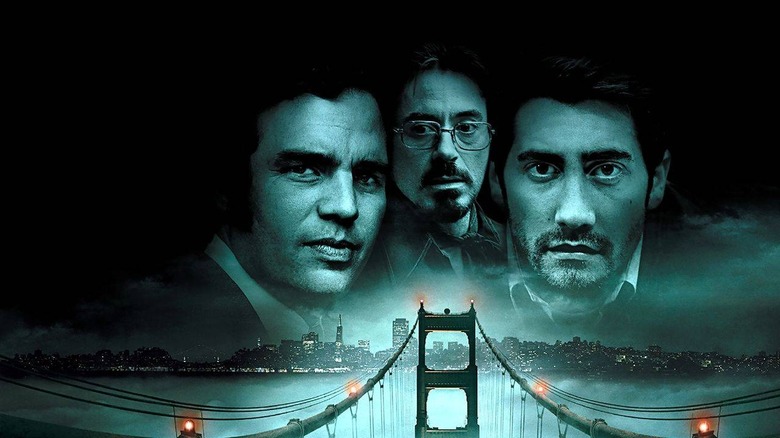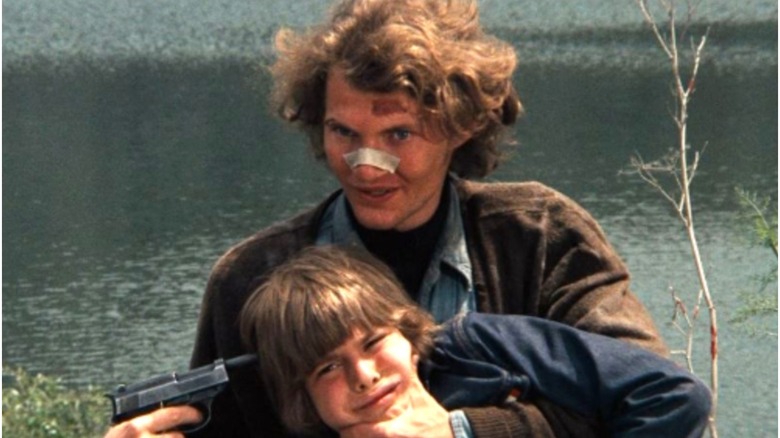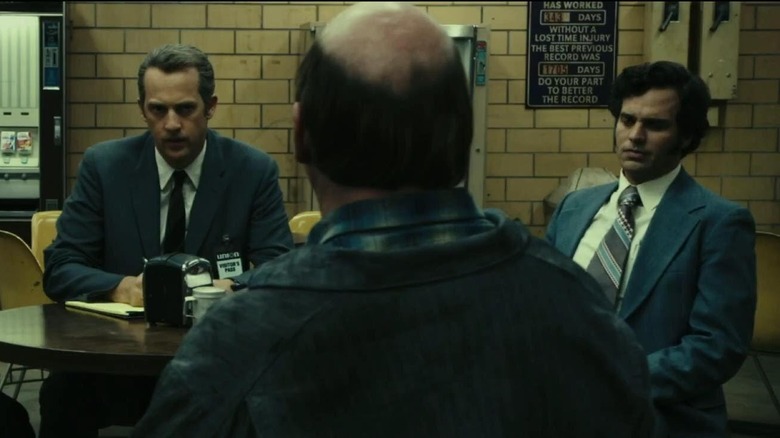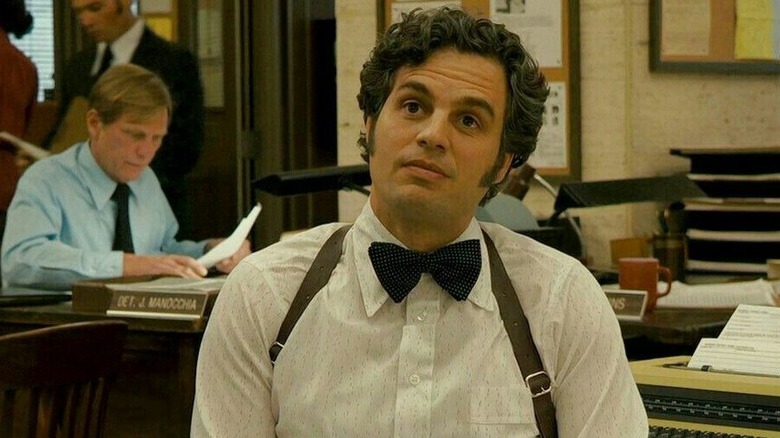
The most enduring true crime stories are always the unsolved ones. What makes mysteries enticing is the art of playing detective yourself, which is easier to do when there isn't a known answer. That's why one of the most infamous serial killers is the Zodiac, a serial killer who haunted Northern California during the late 1960s, taunting law enforcement by sending letters about his crimes to local newspapers. Responsible for five confirmed victims (and possibly many more), the Zodiac communicated with the public via his letters sent to the press, leading to his lasting infamy. To this day, the killer remains unidentified; considering how much time has lapsed, they probably always will.
The best film depiction of the case is David Fincher's "Zodiac," mostly adapted from Robert Graysmith's "Zodiac" book (Graysmith is played by Jake Gyllenhaal in Fincher's film). However, "Zodiac" was also influenced by an earlier film inspired by the case: "Dirty Harry."
Zodiac, Meet Scorpio

The villain of "Dirty Harry" is the Scorpio killer (Andrew Robinson), a clear stand-in for the Zodiac. Both killers terrorize San Francisco and have astrological theming in their names ("Scorpio" being one of the 12 signs of the Zodiac). Like his real-life inspiration, the Scorpio communicates via letters left for the authorities. The film's climax, where the Scorpio hijacks a school bus and holds its young passengers hostage, calls to mind a letter the Zodiac sent to the San Francisco Chronicle in 1969: "School children make nice targets I think I shall wipe out a school bus some morning."
The Scorpio is not a 1 to 1 analogue, though. He snipes his victims, while the Zodiac preferred up-close kills. He also initially holds the city for ransom, whereas the Zodiac seems to have been driven purely by psychotic ego. Most significantly, karma comes for him: The Scorpio is ultimately shot dead by Harry Callahan (Clint Eastwood), while the Zodiac escaped justice. In all likelihood, the real-life Zodiac killer died without ever being punished.
The Zodiac was still fresh on people's minds when "Dirty Harry" was released in 1971. The last confirmed Zodiac killing had happened just two years prior in October 1969, and the letters would continue sporadically until the final one to the Chronicle in 1974. Seeing Scorpio gunned down onscreen gave the audience the catharsis that reality denied them.
This further shows how "Dirty Harry" embodies the reactionary corners of the 1970s' zeitgeist. During the film's premiere, Tricky Dick was in the white house, elected on a "law and order" platform. Harry Callahan personifies this rallying call; even if he does bend authority, it's only to ensure people's safety. Rather noxiously, many of the criminals who Harry arrests are explicitly shown to be black. However, not all viewers found security or relief in the film.
Fincher On Dirty Harry

One of those dissatisfied viewers was a young David Fincher. Fincher spent his early childhood in Marin County, California, which meant he had a front-row seat to the media circus around the Zodiac killings. His history with the case made "Zodiac" a more personal project for him. He recalls in a commentary for the film that reading James Vanderbilt's script was cathartic, "there was an answer to why there was no answer."
"Zodiac" even contains a scene where characters watch "Dirty Harry" in a movie theater; inspector Dave Toschi (Mark Ruffalo), one of the inspirations for Harry Callahan, walks out. According to Fincher, this dismissal reflects his own feelings towards "Dirty Harry"; the film's handling of the Zodiac "appalled" him when he first watched it (via IndieWire).
Fincher elaborates in the "Zodiac" commentary:
"In my conversations with David Toschi and Robert Graysmith, they were a little amused by the way Hollywood had depicted the Zodiac, they were sort of tickled by it. Because I didn't see "Dirty Harry" till I was probably 12, I didn't see it until its rerelease, but I remember because Zodiac was such a kind of a personal thing, like this person had kind of crept into our personal unconscious, and f***ed with us for so many years, that when I saw Zodiac as plot device in the movie I was a little bit appalled ... [Toschi] was a little sickened by how easily it was concluded in the movies and kind of resented the fact that people were saying to him, 'hey, Clint Eastwood sure did a great job with your case.'"
Where Dave Toschi Fell

Speaking to Collider in 2007, Ruffalo indicates that Toschi walking out of "Dirty Harry" was pulled from reality:
"He couldn't take it. It was so simplified. He was in the middle of one of the biggest cases in the United States at the time and they were having no movement on it and he knew they had a mountain of evidence and it took them nine months to get a search warrant to toss the guy's trailer. He was just crawling out of his skin and the guy [Dirty Harry] just walks up and he's like 'I don't care. If you're going to walk free, I'm gonna blow your brains out' and the audience just [he starts clapping] 'yeah! All right!' We all did it, right? I think that was frustrating for him. He would like to do that."
While it may have been frustrating for Toschi, the genius of "Zodiac" is its refusal to give easy answers. The film recaptures its setting not just through painstaking research and historical accuracy, but in how haunting the lack of resolution is. Fincher is right that the Zodiac lingers in the American consciousness like a hole that can't be filled. The film recreates this anxiety in its viewer because it doesn't give a definite answer; the Zodiac might have been Arthur Leigh Allen (John Carroll Lynch), but no matter how compelling the circumstantial evidence, we don't know. There are few things that compel or linger in the mind like an unanswered mystery, and compared to this haunting ending, the easy justice of "Dirty Harry" rings hollow.
Read this next: 13 Box Office Bombs That Are Truly Worth A Watch
The post A Lot of Hate For Dirty Harry Inspired David Fincher's Zodiac appeared first on /Film.
0 Comments